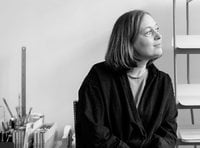Muuto's Workshop table continues the story of the wooden furniture collection designed by Cecilie Manz. The dining table combines traditional Scandinavian craftsmanship and modern design in an inviting manner: the sturdy solid oak frame has been finished with rounded edges and legs. The organic appearance makes Workshop the perfect addition to various kinds of kitchens and dining rooms, and its simple and robust design also makes it an ideal desk for the modern home office.
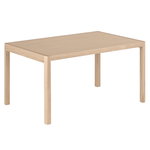
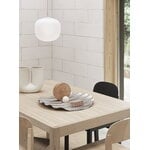
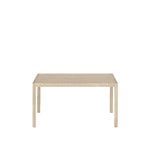
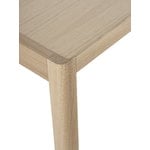

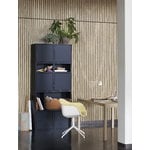
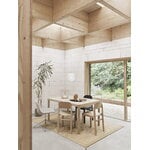
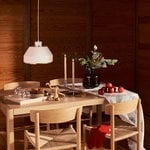
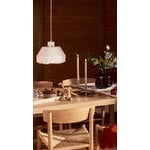
Workshop table, 140 x 92 cm, oak - oak veneer
Muuto
Description
Muuto's Workshop table continues the story of the wooden furniture collection designed by Cecilie Manz. The dining table combines traditional Scandinavian craftsmanship and modern design in an inviting manner: the sturdy solid oak frame has been finished with rounded edges and legs. The organic appearance makes Workshop the perfect addition to various kinds of kitchens and dining rooms, and its simple and robust design also makes it an ideal desk for the modern home office.
Product details (8)
- Colour
- Oak
- Length
- 140 cm
- Width
- 92 cm
- Height
- 73 cm
- Table top material
- Oak veneer table top
- Frame material
- Solid oak
- Weight
- 30 kg
- Care instructions
- Clean with damp cloth. If necessary only use a mild detergent. Wipe with a dry cloth afterwards. Remove stains and marks straight away.
- Product ID
Designer
Cecilie Manz (b. 1972) is a Danish designer who studied at the Danish Design School with additional studies at the University of Art and Design Helsinki. Cecilie Manz has designed furniture, glass, lamps and related products. In addition to her work with industrial products, her experimental prototypes and more sculptural one-offs make up an important part of her work and approach. For Cecilie Manz function is essential when designing: if a good reason for a new product cannot be formulated, it is better to refrain from making it. Cecilie Manz has designed for brands such as Lightyears, Fritz Hansen, Nikari and Muuto.
For Lightyears she has designed the Caravaggio series of lamps. The main idea behind the Caravaggio series was to create a simple, soft design for small and large pendants. For Lightyears she created also the Mondrian series of lamps. In her development of the lamp series Mondrian, the driving force for the designer was minimalist design. Cecilie Manz has exhibited all over the world and is permanently represented in the exhibitions of the MoMA and the Danish Design Centre. She has been lectured and awarded several significant prizes for her conceptual design.
Read Cecilie Manz's interview >
View all productsReviews (0)
Sustainability
The Product Sustainability Framework, our criteria of sustainable design, helps you find the most sustainable products in our selection. Read below which sustainability criteria this product has met.
Working conditions & labour 7/9
-
Equal opportunities for all employees
-
Commitment to UN Global Compact, fair compensation for all employees
-
Corporate responsibility requirements defined and communicated for suppliers
-
Systematic work for improved inclusion and well-being in the workplace
-
Transparent supply chain
-
Suppliers' compliance to a code of conduct ensured
-
Compliance to the UN Guiding Principles on Business and Human Rights ensured in the supply chain
-
Direct suppliers audited and certified
-
Support for community involvement in the supply chain
Eco-friendly production 9/9
-
Fair and resource-wise water-use in production
-
No incineration or landfilling of returned items
-
No use of endangered species as materials
-
No direct environmental emissions or waste (excl. GHGs) from production
-
The sustainability of direct suppliers' production is addressed and monitored
-
Production and material sourcing that respect biodiversity, animal rights, and natural ecosystems
-
Material-efficient and ecological packaging
-
Positive impact on nature’s well-being through operations that regenerate natural ecosystems
-
No potentially harmful chemicals used in own production
Climate impact 4/8
-
Company's direct greenhouse gas emissions identified and commitment to reduction
-
Product's carbon impact identified and commitment to reduction
-
Guidance on energy- and eco-efficient use of the product
-
Contribution to climate initiatives beyond the brand’s direct operations
-
Low-carbon or compensated transportation
-
Carbon footprint of the product calculated and goals set to reduce it
-
100 % renewable energy in own production and operations
-
Carbon neutral or carbon negative product
Sustainable materials 3/6
-
Sustainable and long-lasting material choices
-
No harmful or hazardous substances
-
Responsible raw material sourcing and production
-
Materials suited for circularity: monomaterials, recyclable finishings, renewable or recycled contents etc.
-
Ecological materials: natural, biodegradable, recyclable or recycled contents
-
Outstanding materials in terms of innovativeness, responsibility, sustainability and circularity: local production or sourcing, 100 % recycled content, C2C-certification etc.
Circular design 4/5
-
High aesthetic quality promoting long-term use of the product
-
Technically durable product design and material choices
-
Design for enduring life-long quality
-
Design and support for product maintenance, repair and upgradability
-
Innovative circular design solutions: circular service system, resale platform, remanufacturing, collection of used products, etc.









